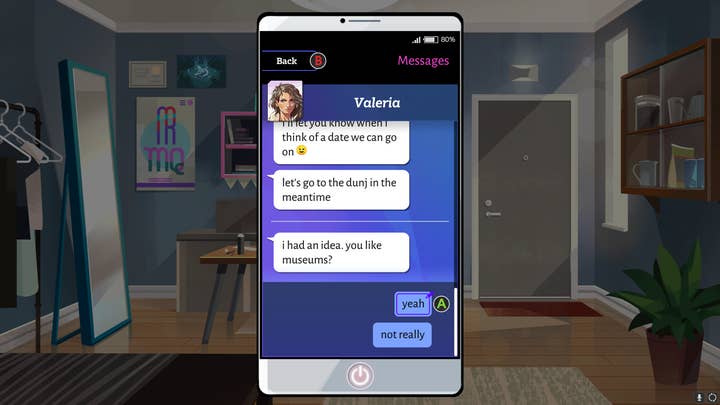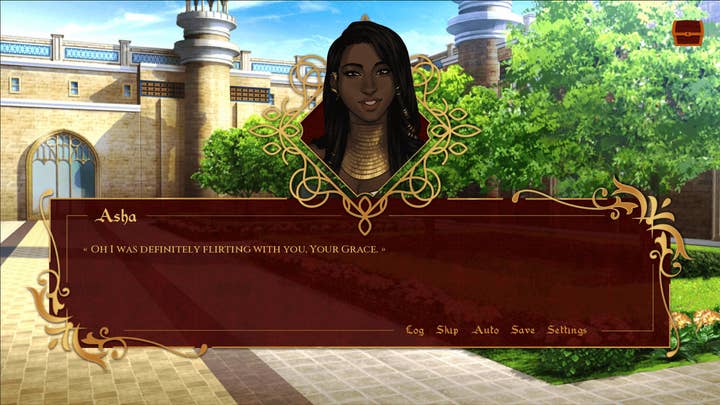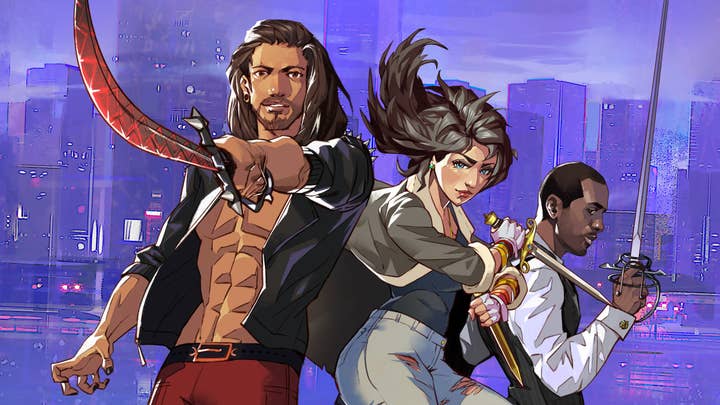The evolution of dating sims: With great romance comes great responsibility
We speak to three developers about the complex stories dating games can tell, and the risks of doing so
Orchestrating a romance has been a pivotal component of a video game narrative pretty much since games had the capacity to include them.
Sometimes, the choices are linear, but more recent offerings have created scenarios where your protagonist can choose from a vast wealth of fictional flames. From fluttering between alien romances in Mass Effect and picking a house spouse in Skyrim, to the hybrid romance options in the lesser-known PS1 RPG/dating hybrid Thousand Arms, relationships are a frequent and often significant part of a story.
Traditionally, most dating games were created with a simple goal in mind: fulfilling a fantasy. In most cases, the player is presented with a series of opportunities to engage in a relationship with a character -- usually female -- where you pull all the strings, and your decisions only ever have positive consequences.
But in recent years, dating simulators have evolved to tell more intricate stories, and not fantasies about love and sex. They're about pain, loss, emotional wellbeing, and the darker side of relationships. That, and they're not just for heterosexual men anymore -- plenty of people in the LGBTQ+ community have embraced the genre, and richer experiences have spawned from creators wanting to simulate the scenarios that they want to play, which appeals to many other players too.
"It's an exciting time, because there's such a hunger out there for well-written romance, and most larger studios still won't risk focusing on relationships as a core selling point," Boyfriend Dungeon creator Tanya X. Short tells GamesIndustry.biz.
"I hope they keep going more mainstream commercially, because although BioWare titles and the like will probably never be as adventurous as more indie content, that kind of spending and normalisation of gameplay mechanics brings oxygen into the space for the rest of us.
"I mostly wanted to give the player a sense of freedom to follow their heart, which I felt was lacking and overly restrictive in otherwise similar experiences I had played."
GB -- from GB Patch Games, developer of visual novel Our Life: Beginning and Always -- praises the variation of dating sims available now. "I remember in the past, slice-of-life content was the core part of many dating sim experiences (even if it was set in a more fantastic world) and similar sorts of right/wrong-based choice systems," they say.
"The genre was gaining its footing, so a lot of it was kind of simple (my own games included). As the years have gone by, there's been an increase in plot-based elements, more heavy gameplay features paired with dating sim ones, and other ways choices influence the story. It's very interesting to see what people are coming up with, though I definitely still enjoy the slice-of-life type of dating sim too."

Broaching difficult topics also comes at a cost. Developers, writers and designers need to be cognisant of the real-world scenarios they are recreating in their work. The penalty for not doing so is heavy criticism, despite a creator's best intentions.
This recently surfaced in the form of controversy surrounding Boyfriend Dungeon, because of its handling of some unsavoury topics, including stalking and manipulation.
Developer Kitfox Games was met with requests to add an option to skip certain interactions, with some players asking for the dialogue -- which played a key role in the overall story -- to be removed. This prompted a discussion around the inclusion of such themes at all. Kitfox added further warnings, as well as fixing some other sensitive references. The content remains largely the same but the question still lingers -- is there a story that shouldn't be told in case it hurts its audience?
"That is for the artist and their audience to decide together -- the artist in considering what art is worth their time to make, and the audience in considering what art is worth their time to experience," Short says.
"You can hope to represent yourself, if you are ambitious, and you can hope not to alienate others, if you are considerate"
Tanya X. Short, Kitfox Games
"All art teaches us more about ourselves, in that we can observe how we react to it, at the very least. Even a crudely-made drawing by a child has different meanings to each of us depending on our experiences.
"Similarly, we all bring our romantic baggage (or expectations) to a product that claims to provide a fantasy of romance... When someone plays dating sims, we can come to see what it is in that fantasy that we enjoy, and why, and what risks we should or shouldn't take in our love lives.
"To that end, I suppose it's unavoidable that a game with an intimate, contemporarily relatable topic like dating would include topics that can't be completely de-personalised."
Johanna M. at Synstoria, the developer of upcoming fantasy dating sim Imperial Grace, also comments on the tension between free creative expression and the desire to do no harm.
"I believe creators should be allowed to tell the story they want, but on the other hand, I know that every work of fiction contributes to creating our society," she says.
"Sometimes they are inevitable, as the creator really wants to romanticise something particular that someone can find really hurtful. At the very least, I wish authors who talk about hurtful topics insensitively were aware of it, so they can try to balance it as much as possible, by warning their potential players to make sure the line between fiction and reality is clear.
"All works of fiction can alert against toxic behaviours or dangerous situations. Dating simulators can also do it. We just have to be careful that it remains a game, a story in which we want to immerse ourselves and live emotions, not a disembodied message of prevention."

Despite the evolution into more serious and complex themes, dating sims are still considered taboo, because of preconceived notions of sexual content. While there is a pocket of the genre that does include NSFW content, it doesn't represent dating games as a whole. The inclusion of said content also doesn't mean that a game can't tell a more in-depth story.
"It's funny because dating sims seem to waver between either being 'too girly' or 'too porny,'" Short says. "On the other hand, a dating sim fan's expectations of what kinds of content you're offering seems to vary extremely wildly based on their past experiences."
Johanna also comments on how dating sims are often reduced to porn, and how creators sometimes don't list their games under the dating sim tag to avoid the misconception, thus the idea sticks.
"A lot of players play dating sims without knowing they are dating sims," they say. "So maybe it could be a good idea to promote the subgenre because those games do not carry those preconceived notions?"
Even with taking every care with how sensitive or lewd stories are told, and keeping inclusion at the heart of a project, it is incredibly difficult to ensure that absolutely everyone's wants are catered for in a dating sim.
Short tells us about pitching a romance-themed event to Valve for Steam, with sales on various dating games and talks on the genre. Valve was hesitant, and pointed out that curating games by what is considered "acceptable" or not in terms of sexual preference, nudity, and language is almost impossible at scale.
"You can never represent everyone," Short says. "You can hope to represent yourself, if you are ambitious, and you can hope not to alienate others, if you are considerate."
GB's main concern as a developer is not having their message conveyed correctly. They are also not sure that total representation is possible for every game, but it is made easier through customisable characters where players can select their own preferences.
"It's always worrying that people won't take away what you hoped/expected from your attempt at tackling a serious topic," they say.
"I don't feel like [representation] is possible for every game to strive for. There's a limit to character cast sizes and tons of different types of people who exist. However, some games can try to attempt it through customisation and such.
"Currently, we're aiming to create highly customisable main characters (in terms of appearance, personality, interests, sexuality, gender identity, etc.) so that whoever plays the game can feel included."
"I often see very serious things used as a simple pretext for a tragic backstory. Unfortunately, not developing a sensitive topic often trivialises it."
Johanna M., Synstoria
Johanna's worry lies in the unknown, and how a developer can accurately portray something without necessarily experiencing it.
"I'll always research as much as I can, if possible, by talking to people who are affected," she explains. "Having a [sensitivity] reader is very important in these cases, to make sure that we don't give false ideas based on our own prejudices, and that we don't hurt people on purpose.
"I also think that someone should only address a sensitive subject if they really want to talk about it and intend to develop their point. I often see very serious things used as a simple pretext for a tragic backstory and never developed otherwise. Unfortunately, not developing a sensitive topic often trivialises it."
While it's often difficult to convey a difficult story correctly, the overall evolution of dating sims as a genre has been positive. The popularity of narrative-driven romantic stories has led to a wealth of different creators leaning to it, and that has ultimately spawned countless games that cater to a spectrum of players.
"When you have amazing creators like [Ladykiller in a Bind developer] Christine Love working in the space, you can hope that there's room for all the different kinds of dating sims, even if some of them aren't to your personal taste (or the kind you'd bring home to play with your mom)," Short says.
The genre has also become a haven for LGBTQ+ developers and storytellers specifically, which has led to a positive spike in the number of games made by marginalised people, for marginalised people.
"There's also been a definite increase in queer romance options within dating sims as time has gone on, which is wonderful," says GB.
"I think continuing to make/promote these games is helpful. Every year more people seem to know of the genre and know more about it. It's getting to be a pretty staple genre and that'll help it come across as less of a strange, questionable thing."
Johanna also adds: "I had a hard time to find LGBTQ+ friendly game before, but now I have an infinite backlog and so many exciting projects to follow."

